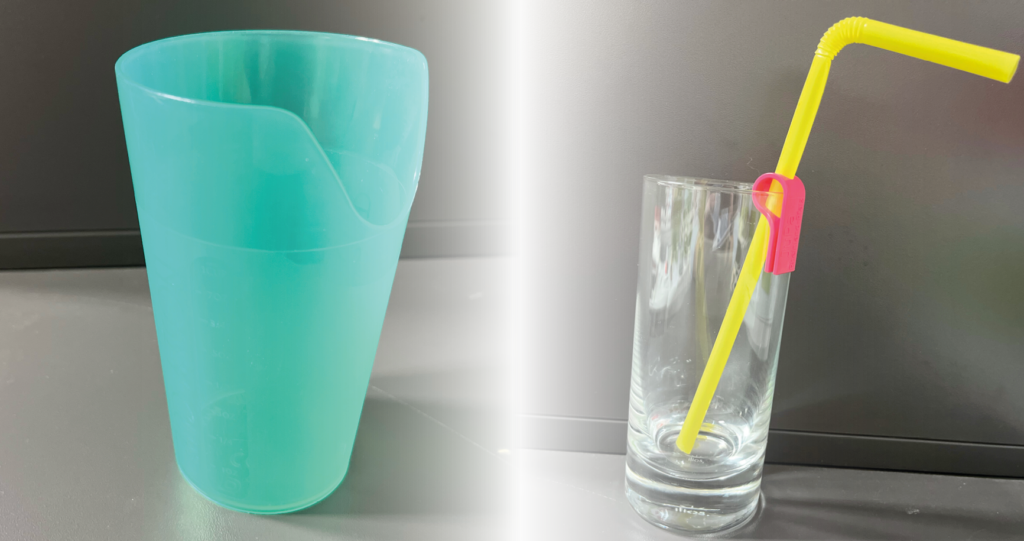Drinking difficulties with Parkinson’s and the importance of adequate hydration
One challenge often underestimated for people with Parkinson’s is drinking. Adequate hydration is essential for general health and well-being. People with Parkinson’s can encounter various obstacles to drinking and drinking aids may be a gamechanger:
For example, swallowing difficulties (dysphagia) often occur during the course of the disease and cause patients to have difficulty swallowing liquids safely. This increases the risk of aspiration (fluid entering the windpipe) and pneumonia.
Tremors, particularly resting tremors, which are a typical cardinal symptom of Parkinson’s, often make it difficult to hold a glass or bottle, increasing the risk of spilling liquids or causing serious injury, for example if a glass filled with liquid falls to the floor due to tremors and you injure your limbs.
Muscular stiffness (rigor) and slow movement (bradykinesia) can also affect coordination and grip, making it difficult to lift a drink and thus drink.
In addition to the motor symptoms, forgetfulness and apathy also play a role in some patients. Cognitive impairments and motivation problems can lead to those affected neglecting to drink regularly.
Why is adequate fluid intake important?
Good hydration has many positive effects on the body, especially in people with Parkinson’s. Many sufferers suffer from digestive problems, especially constipation. Adequate fluid intake supports intestinal activity and prevents discomfort.
Drinking an appropriate amount can optimize the effect of medication, because Parkinson’s medication works better when taken with sufficient fluid. Dehydration can reduce or delay the effect of the medication.
Lack of fluids can lead to confusion, dizziness and fatigue, which can worsen existing cognitive impairments. Drinking more can therefore have a positive effect on mental performance.
From my own experience in dealing with Parkinson’s patients, I know that blood pressure fluctuations and often blood pressure that is far too low often have a negative impact on coping with everyday life. Adequate hydration can stabilize blood pressure, support your own mobility and help prevent muscle cramps and circulatory problems, which in turn can reduce the risk of falls.
Tips for making drinking easier
Various manufacturers have created ways to make drinking easier for people with Parkinson’s. Certain cups with special handles, nose cutouts, drinking straws or anti-tremor cups are available that make independent drinking easier or even possible even with tremors or rigidity.
In cases of rigidity that make it difficult to tilt the head back when drinking, a plastic cup with a cutout for the nose can make drinking easier. The large opening also allows for precise monitoring of fluid intake. There are also cups with a rotating handle that can be easily held in a stable position while drinking, reducing shaking to a minimum.
The F.O.T.T. drinking cup has also proven to be particularly effective for stiff necks. This special cup promotes independent and safe drinking. The wide rim of the drinking cup rests on the lower lip to support reflexive swallowing and prepare for the swallowing process. The lid is wide enough to fit over the bridge of the nose and to take the drink without overextending the cervical vertebrae. The small holes in the lid ensure that the drink is fed into the mouth in a finely dosed manner, whereby the moistening of the mouth and the contact of the drink with the floor of the palate trigger the swallowing reflex. Using F.O.T.T cups as drinking aids make it easier to swallow small amounts of liquid.
Some patients find it difficult to swallow very thin liquids. Therefore, thickening liquids (e.g. with gelling agents) is sometimes a good tip for safer swallowing if the risk of choking can be reduced. A trained dietician will be happy to help you determine the correct dosage of thickening agents as drinking aids.
Sometimes it is the own forgetfulness that prevents from drinking enough fluids. Regular reminders, such as reminder apps, drinking clocks or family members, can help not to forget to drink regularly.
The taste of a drink also plays a significant role. Not everyone likes to drink tea or water all the time. Furthermore, people with Parkinson’s often lose the feeling of thirst, so it can help to offer tasty drinks. What’s wrong with a glass of orange juice or an evening beer or a glass of red wine?! Everything in moderation is perfectly acceptable. With grapefruit juice and the simultaneous intake of medication caution is advised: This can cancel out the effectiveness of the medication. In the case of dairy products, this is proven and must be avoided. And it goes without saying that you should not take alcohol when taking tablets.
Because drinking is often a challenge in general, some people feel easily overwhelmed by drinking large amounts. Small, frequent drinks can help if drinking large amounts at once is difficult. On the other hand, a large carafe of water on the table reminds you of the amount you need to drink every day. The individuality of the person plays a role here.
My conclusion
Adequate fluid intake is essential for people with Parkinson’s to avoid health complications. Targeted adjustments and aids can make drinking easier and improve quality of life. Relatives and caregivers should actively support hydration to prevent dehydration and its consequences.
Further Link:
https://www.michaeljfox.org/news/ask-md-parkinsons-swallowing-changes-what-expert-wants-you-know

